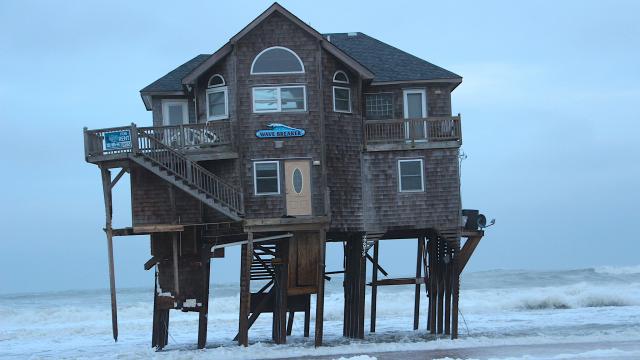Holiday home rentals are a fun and often affordable alternative to hotels, but they’re also less regulated and more prone to scams. Crooks have come up with plenty of schemes to make a quick buck off of oblivious holidaymakers using nice photos of non-existent rentals and up-front cash security deposits. That’s why it’s important you know how to spot fraudulent listings online.
[referenced url=”https://www.lifehacker.com.au/2018/04/how-tonot-get-scammed-when-selling-things-online/” thumb=”https://www.lifehacker.com.au/wp-content/uploads/sites/4/2018/04/SCAMMERS-410×231.jpg” title=”How To Not Get Scammed When Selling Things Online” excerpt=”If you’re looking to cull some of your unwanted books, say, or other possessions, you’ll want to be careful of how (and to whom) you’re selling your old stuff.”]
Not only are holiday rental scams possible, they’re big business for criminals. According to fraud protection company Forter, travel fraud increased by 16 per cent in 2017, and it continues to rise.
One study from the American Hotels and Lodging Association found that nearly 55 million bookings a year are made on fake travel agency or hotel websites.
Fortunately, with a small amount of pre-booking research, you can avoid showing up to a make-believe rental property you’ve already paid for.
Check the Photos
The first thing you should do is check the listing’s photos.
How many photos are there? If there’s only one poor-quality image of the rental, that’s a red flag. There should be several photos that allow you to see all angles of the home, including several rooms. If the photos are only from the outside, that’s also a red flag.
Now, how nice are the photos? Are they too nice? The images should be decent quality — at least smartphone quality — but be wary of listings that only have a couple of Photoshop-perfect looking pics.
If you aren’t sure about a listing’s photos, do a Google reverse image search. In Google Chrome, right click the photo and select “Search Google for this image”. If you see the same photo being used on a bunch of other sites, especially stock photo sites, that’s a huge red flag.
Also, don’t hesitate to reach out to the owner or renter and ask for additional photos. If they can’t provide them, proceed with extreme caution.
Research the Property and Area
If the photos don’t seem too fishy, the next thing you should do is search for the property on Google Maps with the address provided. Make sure the property is actually located where they say it is.
Then, use the Street View option to get a better look at the property. Does it look like the photos they provided? If it does, so far so good.
While you’re at it, move over to regular ol’ Google Search and see if the address pops up anywhere else. It’s possible the property has been listed on multiple holiday rental service sites. If so, see what the reviews look like to make sure you aren’t getting yourself into trouble. Seeing a lot of decent reviews? Great. Seeing bad reviews, or none at all? Uh oh…
It isn’t a bad idea to check the pricing of other rentals in the area as well. If the pricing for the place you’re looking at is way lower than the other properties in the area, that’s a bad sign. Trust your gut on this. Remember, if something looks too good to be true, it probably is.
Make Sure the Person Listing the Place Is Legit
Since you’re already searching, you might as well keep the ball rolling. Look up the name of the owner or renter and see what pops up. Do they actually live in the area? Do they have a professional renting company? Do they have any social media pages? Basically, does this person actually exist?
Oh, and if you’re contacting them by email, see if that email is posted on all other listings for the same property on different sites. Some scammers will grab photos and logos from legitimate listings then doctor in fake emails and phone numbers. Look for consistency.
And if you found a listing for a place on a site that links out to a booking service such as Airbnb, pay close attention to the URL. Scammers will use lookalike web addresses to try and trick you.
If you really want to be sure you’re dealing with someone above board, ask them a lot of questions — especially questions that aren’t directly related to the property. See what they know about local attractions, restaurants and other area-specific things.
Where’s the closest grocery store? Petrol station? Do they have a favourite place to eat? What do they recommend there? If they can’t offer recommendations, be wary.
No Rental Agreement, No Rental
If there is no rental agreement, either digital or physical, it’s probably a scam. All reputable owners and agencies will have them since the terms will protect both parties. If they don’t have one, look for something else.
Pay With Credit Card Only
Criminals greatly prefer cash or wire-transfers, so you should never use them when paying for a rental. Always use your credit card instead. Cards such as Visa and MasterCard let you dispute charges and will help you recover money lost through fraud. And never pay outside of a rental site’s platform if possible.
Lastly, watch out for security deposit scams. The most common scam is a fraudulent renter asking for an upfront cash deposit, usually for several hundred dollars. Don’t fall for it. Use your credit card for the deposit as well, but before you pay, do some research. Check your state laws regarding collecting security deposits. And if something seems off, don’t be afraid to call them out on it.

Comments